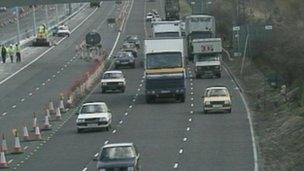Motorway middle-lane hoggers to face on-the-spot fines
- Published
- comments

Tailgating and middle-lane hogging will now incur fixed penalties
Motorway tailgaters and middle-lane hoggers are to face quick justice with on-the-spot penalties under new measures announced by the government.
From July, police will be able to issue £100 fines and three points for careless driving offences that would currently have to go to court.
The idea is to target offenders without the need for lengthy court procedures.
Current fixed penalties for using a phone while driving or not wearing a seatbelt will also rise by £40 to £100.
The move brings careless driving offences into line with the penalties for similar non-motoring fixed penalties. Drivers will still be able to appeal against any decision through the courts.
'Pet hates'
People guilty of careless driving will face fixed penalties or the chance to go on a driving course, but the more serious examples will continue to go through the courts, where offenders could face much higher fines and penalties.
Many offences currently go unpunished because of the bureaucracy involved in taking a case to court.
Not only does a motorist have to be stopped by the police, but a summons has to be issued and evidence presented in court.
Road Safety Minister Stephen Hammond said: "Careless drivers are a menace and their negligence puts innocent people's lives at risk.
"That is why we are making it easier for the police to tackle problem drivers by allowing them to immediately issue a fixed penalty notice rather than needing to take every offender to court."
The AA said responsible drivers would welcome the changes.
"We are also pleased to see that at long last new powers and fines will be given to the police to tackle the top three pet hates of drivers - tailgaters, mobile phone abusers and middle lane hogs," said AA president Edmund King.
RAC Foundation director Professor Stephen Glaister said: "Anti-social behaviour is as big a problem on the roads as it is in wider society.
"Giving police more discretion to act, and freeing up resources to allow them to do so by cutting procedural delays in court, is good news.
"Raising the fine level to £100 is justifiable to tackle the plague of handheld mobile phone use which slows drivers' reaction times even more than being at the drink-drive limit or taking cannabis."
Downplays the offence
Tim Shallcross, Institute of Advanced Motorists: ''For on-the-spot fines, you need on-the-spot policemen''
But the Institute of Advanced Motorists (IAM) said it had concerns about the message sent out by the changes.
Its director of policy Neil Grieg said: "This is a major change in traffic law enforcement and the IAM is concerned that issuing fixed penalty tickets for careless driving downplays the seriousness of the offence.
"Careless covers a wide range of poor to reckless driving behaviour that often merits further investigation.
"This could free up traffic police time and allow them to maintain a higher profile.
"But without traffic cops out on the road to enforce this new approach it will have little impact on road safety."
Motoring journalist Quentin Willson also questioned whether there would be enough traffic police to make the changes work.
He said: "It's broadly to be welcomed because it marks a shift away from remote policing - that's cameras - to actually using traffic cops.
Motorists' views: "Just a money-making thing'' or "fair enough"?
"But the problem is the amount of traffic police cars has been cut since 1997 by 50%, so the obvious question is 'how do you enforce this?' It's deeply faulted."
Richard Owen from the research group Road Safety Analysis said most motorists would welcome the changes.
He told the BBC: "We already know that the UK's motorways are some of the safest roads in the country, if not Europe.
"But of course, that relies on everybody playing their part and sticking to the rules and I think most motorists would welcome any further enforcement to make sure that people aren't lane hogging or maybe tailgating."